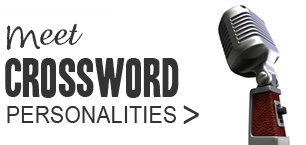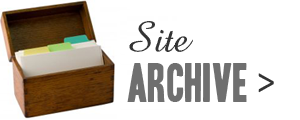 | The welcome message on Big Dave's Crossword Blog greets us with the line: "You have reached the world's biggest and best crossword blog." That is no overstatement. Just 21 months old and the blog already attracts 5000-6000 views per day and has the best crossword minds from around the world contributing as bloggers/commenters. In this interview, Big Dave talks to us about himself, his experiences with crosswords and the story behind his phenomenally successful blog. |
Q1. When and how did you start solving crosswords?
Big Dave: The very first crosswords I ever did were the picture crosswords in the old London Evening News. I progressed, in stages, to the Daily Telegraph Cryptic when I was about 15. Over fifty years later, I’m still solving the Telegraph Crossword!
Q2. How did Big Dave's Crossword Blog come into being?
Big Dave: Following my retirement I had been answering crossword clues on AnswerBank for about three months. I then started helping James Cary, who at the time was writing about the Telegraph puzzles on his Crossword Ends in Violence site. I decided to supplement this by setting up my own site, Big Dave's Blog, to review the Telegraph Toughie puzzles.
A week later James wrote to me and asked if I would take over the "responsibility" for the regular cryptics. At this point the name was changed to Big Dave's Telegraph Crossword Blog to make it easy for other sites to publish a link. Gazza and Libellule, whom I had met on AnswerBank, were very soon persuaded to join me.
I chose to drop the word Telegraph a year later to clarify that my blog had no connection with the Telegraph Group.
Q3. Your blog has built a large following in a fairly short span of time. What is the secret of its popularity?
Big Dave: I like to think that part of the success was due to being a complete novice and having no preconceived idea how a solving blog should be run – I only became aware of Times for the Times and Fifteensquared after I had started.
The blog has evolved largely by reacting to requests from other solvers, but right from the start I have tried to keep to, as it says in the tagline, “crossword clues explained in plain English”. I have actively avoided words like anagrind and inserticator and the use of symbols like * for anagrams and << for reversals. I tell new bloggers that they should try and write as if they are explaining a clue to a smart 21-year-old – in other words, assume that the audience lacks experience not intelligence.
Discussions of solving times are also actively discouraged – solvers are not in competition with each other!
Q4. An impressive group of bloggers contribute to your blog. How did you all get together?
Big Dave: As mentioned earlier, Gazza and Libellule joined me from AnswerBank. Peter Biddlecombe and Tilsit volunteered their services. The rest had their arms twisted either at crossword meets or by email. Once you start blogging it becomes dangerously addictive – perhaps one day we will have to set up Bloggers Anonymous!
Q5. Has blogging about crosswords changed you in any way?
Big Dave: The biggest change is the wonderful collection of cyber-friends that I now have – and I have been very pleased to be able to actually meet a number of them, setters and solvers alike.
Q6. Have you ever had to face criticism about your blog or your views expressed on it? How did you handle it?
Big Dave: There has been occasional criticism about our reviews, but some setters will always be more popular than others and I can't change that.
A few people have commented adversely on the hints that we give for prize puzzles. Several other sites will only refer to prize puzzles after the closing date, but the Telegraph intentionally publish an easier puzzle on Saturday in order to attract a large number of entries. I take the view that this is an excellent opportunity to help less-experienced solvers.
Q7. Big Dave's Crossword Blog receives a huge volume of comments. How do you manage them?
Big Dave: With WordPress you can choose to allow anyone who has been previously approved to comment without further moderation. This means that very little management is required.
Unlike some other sites, off-topic comments are encouraged. This does mean that at weekends it can be difficult to read all the comments and some questions get asked more than once, but this is a small price to pay.
The important thing to me is that people feel welcome on the site.
Q8. Which crosswords do you solve, other than the Daily Telegraph?
Big Dave: Not as many as I used to! I solve occasional Guardian and Independent puzzles, particularly if they are drawn to my attention. I write a blog of the Guardian Quiptic, every four weeks, on Fifteensquared.
Q9. If you could change one thing about the Telegraph crossword, or crosswords in general, what would it be?
Big Dave: Easy question! I would throw ninety per cent of the Telegraph grids in the bin and replace them with a set similar to those used by the Times.
Q10. What are the crossword references you use?
Big Dave: The one I use most is WordWeb Pro – this gives me immediate cut-and-paste access to Chambers Dictionary and Thesaurus as well as the Oxford Dictionary of English – invaluable for writing reviews. I also keep the hardback version of Chambers Dictionary, Chambers XWD Dictionary of Abbreviations and Mrs Bradford’s Crossword Solver’s Dictionary close at hand.
Q11. What is your take on the use of solving aids - what is fair, what is cheating?
Big Dave: Solving aids are the great leveller. I have no objections whatsoever to them and don't regard their use as cheating. You still need to understand the wordplay to know which of several possible answers is the one required, and solving aids can't do that - but the blog can! Never forget that for most people crosswords are for entertainment.
Q12. Who are your favourite compilers?
Big Dave: A difficult question, but I'll confine my answer to Telegraph setters. Those that I always look forward to are, in alphabetical order, Brian Greer, John Henderson (Elgar, Enigmatist), Mick Hodgkin (Micawber, Morph), Philip Marlow (Shamus, Hypnos), John McKie (Myops), Roger Phillips (Notabilis, Kea), Roger Squires (Rufus), and Ray Terrell (Beam).
Q13. The crossword world in UK is a close-knit one where solvers and setters know each other not just distantly through crosswords but also personally. Does this create conflict or the possibility of strained relations, when a setter's crossword is reviewed negatively on your blog?
Big Dave: It hasn't happened yet. I have had an excellent rapport with all eleven Telegraph setters that I have met.
Q14. Which articles on your blog are the most popular? Which are your personal favourites?
Big Dave: The most popular posts are the Saturday Prize Puzzle hints, which I call "Big Dave’s Saturday Crossword Club". These are also my personal favourites.
The most popular fixed page is my "Crossword Guide" which has been viewed over 12,500 times.
Q15. What advice would you give to a new crossword solver?
Big Dave: The most important thing is to learn to ignore the surface reading of a cryptic clue. That can be quite difficult at first, but you have to treat each clue as a miniature word puzzle.
Solving blogs have made life so much easier for novices. I'm sure that I wasn't the only one that used to think there was a mistake in the puzzle when I couldn't unravel a clue – now you can check very easily, and the setter is (nearly) always right.
Q16. Please share with us some of your memorable crossword-related experiences.
Big Dave: Probably my best experience was when, in the early hours of a Saturday morning, I had solved clues in DT 26044 to which the answers were Big, Dave and Hanley and I rushed to the next clue knowing that the answer just had to be Swan – I live in the Worcestershire village of Hanley Swan. I was able to thank Cephas personally a few months later.
I have had a couple of mentions in other Telegraph crosswords. Brian Greer included Enormous and David in a Sunday puzzle (ST 2545) and Shamus inserted a Nina that read "Shamus salutes Big Dave et al" around the outside of Toughie 368.
The blog even acted as a dating agency for two regulars, who have been an "item" for about six months (and I didn't get an introduction fee!).
Q17. What are your interests apart from crosswords?
Big Dave: I have been supporting Tottenham Hotspur for nearly sixty years, and have been fortunate enough to watch the Spurs win several major trophies – I was at the FA Cup Final replay in 1981 when Ricky Villa scored the best-ever goal at Wembley.
My great passion is for rock’n’roll music – I have a vast collection of vinyl records and CDs, mostly of music from the period 1955 – 65.
Related Posts:
- Interview with The Hindu Crossword setter Cryptonyte
- Interview with Colonel Deepak Gopinath
- Interview with Peter Biddlecombe
If you wish to keep track of further articles on Crossword Unclued, you can subscribe to it in a reader via RSS Feed. You can also subscribe by email and have articles delivered to your inbox, or follow me on twitter to get notified of new links.


 A word used when you cannot or will not recall the name of something, "thingumabob" has many spelling variants.
A word used when you cannot or will not recall the name of something, "thingumabob" has many spelling variants. 

 You're probably familiar with
You're probably familiar with  Crossword setters are often aghast when a slight mistake in their work is pointed out by solvers in blogs. It might be that the anagram indicator or homophone indicator is missing or one of the components in the word breakup is not accounted for in wordplay (or subsidiary indication) for the clue. I don't think any setter in India has the luxury of a pre-publication or test solver. So the onus of checking a set crossword rests entirely on the crossword writer. The following is an attempt on a course to follow in this task.
Crossword setters are often aghast when a slight mistake in their work is pointed out by solvers in blogs. It might be that the anagram indicator or homophone indicator is missing or one of the components in the word breakup is not accounted for in wordplay (or subsidiary indication) for the clue. I don't think any setter in India has the luxury of a pre-publication or test solver. So the onus of checking a set crossword rests entirely on the crossword writer. The following is an attempt on a course to follow in this task.






 Follow on Twitter
Follow on Twitter Join us on Facebook
Join us on Facebook Get RSS
Get RSS
